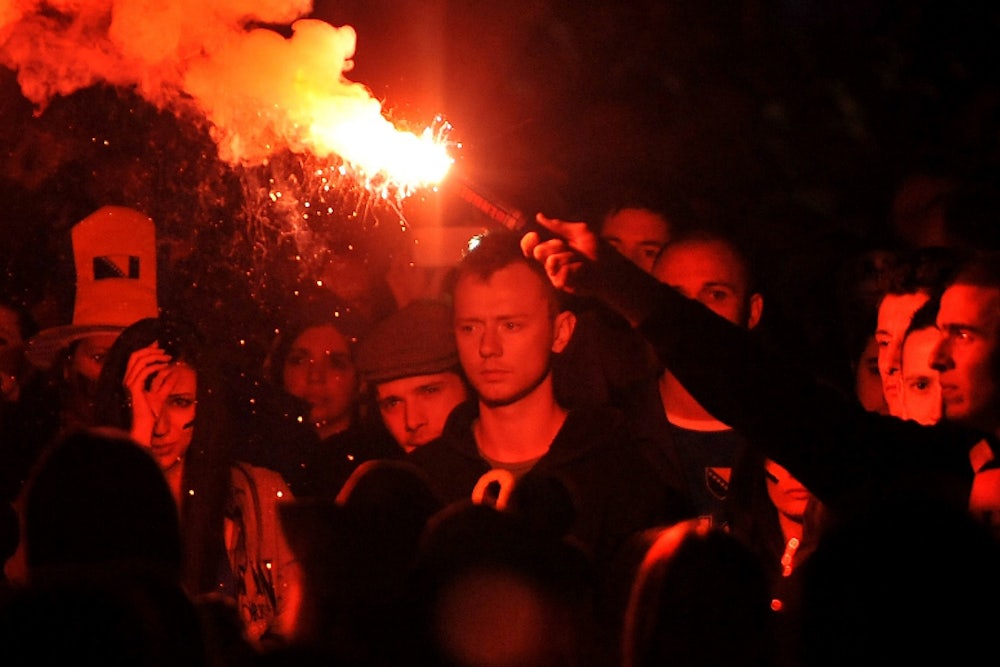In Sarajevo, a city ever running out of parking space, the downtown area was closed last night to traffic for the match between Nigeria and Bosnia. I suppose a massive victory celebration was anticipated. Everyone had been speculating about the outcome, the game largely already won. Everyone, that is, except the national team manager Safet Susic, who was repeatedly quoted as saying that Bosnia just needed a tie with Nigeria. The game to win was the next one, against Iran.
Bosnians are prone to diminishing expectations as much as to wishful thinking, often simultaneously, but last night reality finally put its foot down and cancelled all expectations as well as thinking at large. Subdued columns left downtown after the game to walk home with their heads down, their cape-flags dragging behind them. Everyone was harping about the referee and the perceived injustice. Džeko’s goal, denied by the referee for a non-existent offside position, was a crucial piece of evidence that referees—and therefore the powers-to-be and, ultimately, the universe—are against us. We are out of the World Cup because we were never allowed to win. Another cycle of national self-pitying has begun.
I watched the game in a bar with a large crowd of people, many of them friends. People were wrapped in flags, and wore national team shirts and silly hats. For hours before the game, rousing songs—recorded in time for the World Cup—had been blasting from the sound system, praising Bosnia’s players and their ability to never give up. It was very difficult not to get caught up in thinking that there indeed was a deposit of unused greatness in the Bosnian team—and therefore in all of us—and that they were about to tap into it.
But within thirty minutes, it was clear that some of them did give up, and shamefully so. The captain, Spahic, was abominable. He gave away balls, and was brushed aside in the build up for the Nigerian goal. Džeko seemed to have his mind elsewhere, barely bothering to trot. The one good thing he managed to do was denied and he looked like he decided not to try after that. By the 60th minute, it was clear that the deposit of greatness was long gone, probably spent in the qualifications phase. The two commentators covering the game for Bosnian TV, having decided right from the beginning that the refereeing was scandalous, proceeded to look for excuses for our boys: the humidity, the devious Nigerians rolling on the ground, the Oceania Football Federation, where no real soccer is played for the New Zealand referee to gain respectable experience. When, in the 85th minute, Misimović, who was slow and unfit at his now-distant peak, completely missed the ball, the commentator Muhamed Konjić (who played for Coventry once upon a time and is still known in those parts as Big Mo) proclaimed that if it hadn’t been so late in the game, if it hadn’t been so hot, Misimović would’ve surely scored.
The collective objective was (and it will be for a while) to deflect the blame from the team—and therefore from us—and restore the necessary belief in our honesty and innocence in the face of ubiquitous injustice, deeply embedded in the fabric of the world. See, even the heat and time, let alone the referee, work against us. It is at moments like this that I miss America and its causal belief that the world can be shaped by means of hard work and unflagging belief.
I’d traveled around Bosnia for a few days before the game. I went to Tuzla, the hotbed of February’s protests, to talk to people. They gathered to vent to me their anger about injustice, unemployment, corruption, all of it glaringly exposed by the recent rains, flooding and mudslides. A young man announced proudly that he was “the street” and that fire—that is, burning everything to the ground— is the only and the best way to change things. Other people established a sharp moral distinction between themselves, the victims of it all, and them—“and we know who they are.” Until last night, them and the street were temporarily united in their support of the World Cup dream, everyone hoping to be redeemed by the greatness of the national team. Well, the redemption is out. The fire in Bosnia and Herzegovina might soon start.
